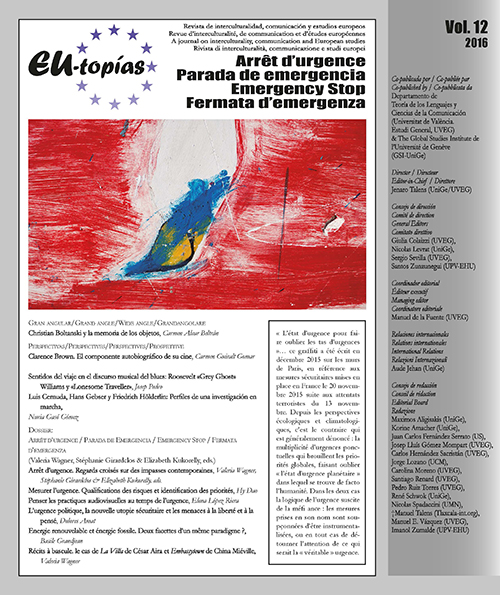Sentidos del viaje en el discurso musical del blues. Roosevelt «Grey Ghost» Williams y «Lonesome Traveller»
DOI:
https://doi.org/10.7203/eutopias.0.18639Palabras clave:
Musical discourse, blues, travel, hobo, African-American culture, Grey Ghost Resumen
Resumen
El objetivo de este artículo es investigar, desde una perspectiva comunicativa, socio-semiótica y etnomusicológica, la construcción de sentido sobre el viaje y el estilo de vida itinerante (hobo) en el discurso musical del blues. Primero realizaremos una contextualización histórica del viaje en la tradición afroamericana, y después analizaremos el caso del legendario músico texano Roosevelt «Grey Ghost» Williams (1903-1996) y de su composición «Lonesome Traveller» («viajero solitario»), en la que se representa el sujeto y estilo de vida hobo (trabajador migrante y sin hogar). En ese proceso, discutiremos el sentido del viaje como imposición y el sentido del viaje como signo de independencia y libertad, señalando finalmente la complementariedad entre ambos.
 Descargas
Descargas
 Citas
Citas
Arnold, Kathleen R. (2004), Homelessness, Citizeship and Identity. The Uncanniness of Late Modernity, Nueva York: State University Press of New York.
Cushing, Steve (2010), Blues before Sunrise. The Radio Interviews, Illinois: University of Illinois.
Davis, Angela (1998), Blues Legacies and Black Feminism, Nueva York: Vintage Books.
DeVeaux, Scott (1997), The Birth of Bebop. A Social and Musical History, Berkeley: University of California Press.
Ellison, Ralph (1995), Shadow and Act, Nueva York: Vintage International.
García Canclini, Néstor (2009), Culturas Híbridas. Estrategias Para Entrar y Salir de la Modernidad, México: Randon House.
Hooper, Dave (1996), «End of the Line: The Passing of Grey Ghost», Austin Chronicle, 26 de julio [http://www.austinchronicle.com/music/1996-07-26/532322/, consultado el 30/03/2015].
Lawson. R. A. (2013), Jim Crow’s Counterculture: The Blues and Black Southerners, 1890-1945, Louisiana: Louisiana State University Press.
London, Jack (1907), The Road, Nueva York: Macmillan.
McLeese, Don (1992), «Ghost’s music haunts Texas blues», Austin American-Statesman, 15 de octubre, p.5.
Oliver, Paul (1990), Blues Fell This Morning. Meaning in the Blues, Cambridge: Cambridge University Press.
Owens, Tary y Hardwig, Jay (1999), «Every Goodbye Ain’t Gone: The Life and Times of the Grey Ghost», texto inédito, consultado en Dolph Briscoe Center for American History.
Owens, Tary (1987), «R.T. Williams Biographical Material», texto inédito, consultado en Dolph Briscoe Center for American History.
Owens, William (1993), Tell Me a Story, Sing Me a Song: A Texas Chronicle. Austin: University of Texas Press.
Pedro, Josep (2016), «The Globalization of Blues: Rural, Urban, Transatlantic», Brian Goss, Mary Gould y Joan Pedro-Carañana (eds.), Talking Back To Globalization: Texts and Practices, Nueva York: Peter Lang.
Steinberg, R.U. (1989), «The Grey Ghost», Living Blues, noviembre/diciembre, pp. 22-24.
Sullivan, Ruth K. (2009), «Tary Owens, Texas Folklorist and Musician: A Life Remembered», Journal of Texas Music History, 9, no. 1, pp. 8-35.
Sullivan, Ruth (2013), «Williams, Roosevelt Thomas [Grey Ghost]», Handbook of Texas Online [https://www.tshaonline.org/handbook/online/articles/fwibe, consultado el 19/04/2015].
Descargas
Publicado
Cómo citar
-
Resumen149
-
PDF71
Número
Sección
Licencia
![]()
Las personas autores conservan los derechos de autor/a. Todos los contenidos publicados en EU-topías. Revista de interculturalidad, comunicación y estudios europeos están sujetos a la licencia Creative Commons Reconocimento-NoComercia-Compartirigual 4.0 cuyo texto completo puede consultar en <http://creativecommons.org/licenses/by-nc-sa/4.0>
Se pueden copiar, usar, difundir, transmitir y exponer públicamente, siempre que:
- Se cite la autoría y la fuente original de su publicación (revista, editorial y URL de la obra).
- No se usen para fines comerciales.
- Se mencione la existencia y especificaciones de esta licencia de uso.
Es responsabilidad de los autores y las autoras obtener los permisos necesarios de las imágenes que están sujetas a derechos de autor.



